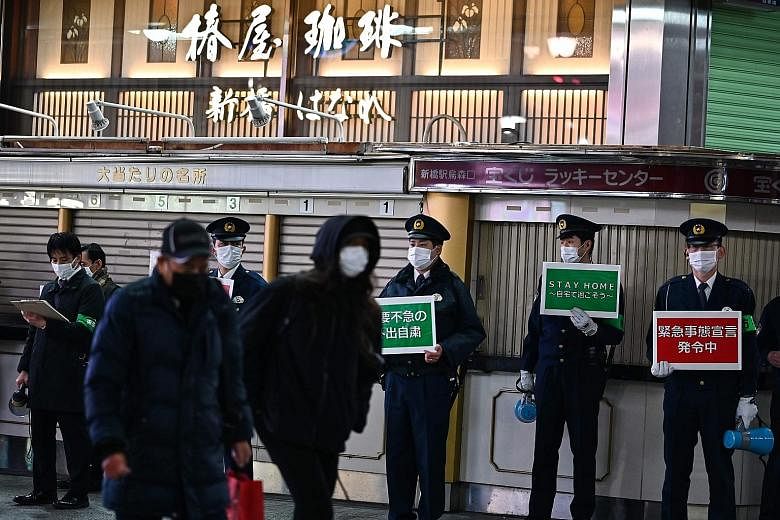Go To Travel, Japan's domestic tourism drive, was once vaunted by Prime Minister Yoshihide Suga as a vehicle to revive a hospitality industry hurt by Covid-19.
But its future is now up in the air.
The campaign, which gives travellers subsidies of up to 20,000 yen (S$255) a night, has been suspended by Mr Suga until Feb 7. The date marks the last day of a state of emergency in effect in 11 prefectures, including Tokyo, Osaka and Fukuoka.
Mr Suga was non-committal in Parliament yesterday, saying only that the Go To Travel campaign will resume "at an appropriate time".
A research study published in the Journal of Clinical Medicine last week showed there were three times more travel-related Covid-19 cases between July 22, when the campaign began, and Aug 31, compared with a control period of one month before the scheme started.
The Japan Tourism Agency also told the Mainichi daily that as at Jan 14, 401 hotel employees and 393 tourists who tapped the travel scheme have been found to be infected with Covid-19.
Hotel clusters have been discovered nationwide, including in Chiba, Niigata, Osaka and Okinawa.
Mr Suga has long tilted towards protecting the economy in his fight against Covid-19, but an apparent shift in his policy thinking comes as he is dogged by a drastic plunge in approval for his Cabinet. Disapproval now exceeds support in many media polls.
His administration is mulling over an extension of the state of emergency by about one month. Despite being limited in scope and failing to stem the movement of people, it has shown relative success in bringing down the number of Covid-19 cases to three-week lows in areas such as Chiba, Kanagawa and Osaka.
In Tokyo, the seven-day moving average stood at 1,202 cases in the week ending Sunday - down from 1,765 cases in the week of Jan 4.
And yesterday, the Japanese capital logged 618 new cases, the daily tally having fallen below 700 for the first time since Dec 28 last year.
The Yomiuri daily cited a government source as saying that the fall in infections "will be meaningless if the emergency gets lifted and the situation escalates soon after".
But the drop in the daily virus case tally belies a critical situation on several fronts. The number of patients in serious condition rose to a new high of 1,017 yesterday, while at least 15,000 Covid-19 patients are on waiting lists to be admitted to a hospital or designated accommodation facility in the 11 areas covered by the emergency decree.
What all this means is a tough balancing act for Mr Suga, who is quickly running out of time and chances to get his policies right in a crucial election year for Japan.
He abruptly pulled the plug on the Go To Travel scheme last month only after being confronted by an obvious shift in public opinion against him. But even then, he continued to insist that there was "no evidence" proving that the initiative had exacerbated the Covid-19 crisis.
He risks further blow-back from the public if he miscalculates when to resume the campaign. The public had, in numerous media surveys last year, signalled that he was being foolhardy to press on with the scheme despite the surge in coronavirus cases.
Experts have pointed to Mr Suga's insistence on the campaign as a turning point in his beleaguered four months in office, given the "confused signals" people received when told that travel was acceptable but that they had to avoid non-essential outings.
A study by Kyoto University researchers Hiroshi Nishiura - who once served as a government adviser - and Asami Anzai found an increase in the number of Covid-19 cases involving the crossing of prefectural borders. They said: "It is natural that enhancing human mobility across wider geographic areas would facilitate additional contact and thus increase the spatio-temporal spread of disease."
Another study last month found a higher incidence of Covid-19 symptoms among those who took part in the Go To Travel scheme.

